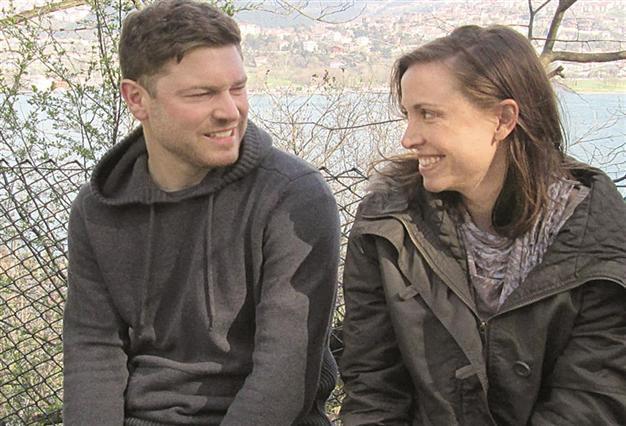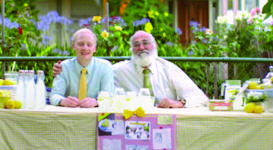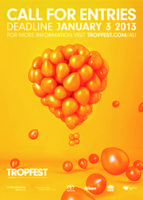Australia’s Tropfest winners on tour of Turkey
ISTANBUL - Hürriyet Daily News

Filmmakers Nicholas Clifford (L) and Alethea Jones were impressed by Ankara and Eskişehir but they think Istanbul was the big one.
If you’re set to do an interview somewhere, Istanbul’s Boğaziçi University campus is not the worst place you could end up at. The recent conquerors of Australia’s Tropfest, the world’s largest short film festival, Nicholas Clifford and Alethea Jones are aware of that too.
“It’s breathtaking,” Jones says, as we speak of the surroundings. “I think it might be one of the best in the world, just from looking at the view, the buildings and the grass.”
Despite being ferried to meeting after meeting in the short week they have been in the country, the directors are upbeat and quite enthusiastic about the tour, which oversees the screening of short films that have entered the annual festival that turns into a massive, outdoor event every year in Australia, attended by over 100.000 people who gather to watch the contestants.

“The Tropfest audience is so vast, you’ve got young children right up to mom and dad,” explains Nick Clifford, the proud winner of 2013, who picked up the trophy for his film “We’ve all been there,” just one month ago. “They bring picnic blankets up and sit down and watch all day.”
The festival, now celebrating its twentieth anniversary, has made quite a name for itself in their native Australia, and has become big enough to attract hundreds of international contestants, and screenings in cities ranging from New York to Abu Dhabi. For the film-makers crowned winners, as both Clifford and Jones testify, everyday life changes almost instantly.
“I’ve won other awards in festivals with other movies and had hoped that that would change my life, that those awards would help my career, and still people didn’t really want to work with me. Then we won Tropfest and that was amazing,” said Jones, who won in 2012 for her film “Lemonade Stand.”
“You wake up the next day — well you don’t sleep,” Clifford puts in. “You’re in all the newspapers, on all the TV channels and everybody knows that you’ve won. As Alethea was saying, you go into other festivals and things like that people might not know about them, but after you win this festival everybody knows about it. It’s very cool.”
And the title has its perks, as Jones explained, it even takes you places, including Turkey.
In anticipation of the upcoming year of 2015, declared to be the cultural year of the bilateral relations between Australia and Turkey, the directors were brought to the country, with the festival director Michael Laventry, to attend a series of screenings taking place in Ankara, Eskişehir and Istanbul.
“When they emailed me and asked me if I’d be interested in bringing Tropfest to a screening in Turkey, I said yes, if I could bring two filmmakers,” Laventry told me. “And that’s been really good; you can see how the filmmakers and the directors have engaged.”
The screenings ranged from public screenings, to university campuses – similar to the one after which I met them to conduct this interview – and even to screenings in Istanbul’s premier art spot, the Istanbul Modern Museum. Some screenings lead to heated question and answer sessions faster than others, and some take a bit longer, as the directors describe with laughter.
“Somewhere the audience would be really open and would talk for 45 minutes, and other ones there would be no one asking questions, but overall they seemed to enjoy the project,” Clifford said.

One of the screenings even prompted them to ask the students to show some of their own films, when the questions seemed rather not to be flowing.
“We just started to ask – because no one was talking – so we asked, ‘Can we see some of your films?’ And yeah it was really great,” Jones says, smiling.
The directors seem just as happy enjoy their surroundings as to share their own art during the trip.
“I think I want to live here,” Clifford says, when I ask him about their reflections of Istanbul, their final stop. “Istanbul is like a moving painting. It’s sort of just keeps going and going. I think that’s been what I’ve really loved.”
Jones adds that the cities that may not have been on their lists, like Ankara and Eskişehir, have impressed them greatly, but Istanbul was the big one.
“I’ve never seen such a clash of cultures between the Asian and European. I’m not really used to that, and it works so well. It’s such a beautiful shining example of how cultures can exist together, and that has really impressed me,” she told me.
Clifford too has noticed the ongoing dynamic in the country.
“It feels like Turkey’s on the move,” he says. We are served tea then, and both directors thank the waiter in a pretty decent pronunciation of the Turkish word. “Feels like an exciting time to be in this country.”
I ask them if they had any fears when they loaded up their works of art to be screened in lands that differ from Australia in more ways than one.
“I think to come over to the other side of the world – you don’t know what to expect – but when it works, it feels really good. I think overall it’s been really positive,” Clifford says.
And eventually it leads to good things, as Jones adds, “This is what this trip is really about on the part of the Australian embassy, to bring us over has been a step towards engaging with the Turkish film industry.”
Laventry too tries to tempt the Turkish side to join in for the ride, eagerly expecting a film from Turkish filmmakers to enter the film festival. Ahead of the screening in Boğaziçi, he briefly explains the rules of competition – movies must be no longer than seven minutes, including credits, they should not be seen anywhere else, and they should include a signature theme that is set by festival officials every year (‘change’ is next year’s). Those whose movies make it to the top 16 finalists will be offered a trip to Sydney.
“Part of my job is to encourage filmmakers,” he told me. “I just offered them a trip to Sydney. Who knows? I might run into someone who might be interested.”
Whether or not next year’s festival will see a Turkish finalist in the massive event is yet unknown, but big things are already ahead for Turkey and Australia in the next couple of years. Plans are already underway for 2015, bilaterally declared the year of culture.
“We’re going to get artists together, everyone together, and think of the future. We’ll be celebrating, looking to the past and to the friendship and where we’re headed to in the future,” Second Secretary of the Australian Embassy in Turkey, Sarah Kelly, told me. “We’re collecting ideas at the moment. The Australian side is working, the Turkish side is working-it’s going to be big, really exciting.”

 “The Tropfest audience is so vast, you’ve got young children right up to mom and dad,” explains Nick Clifford, the proud winner of 2013, who picked up the trophy for his film “We’ve all been there,” just one month ago. “They bring picnic blankets up and sit down and watch all day.”
“The Tropfest audience is so vast, you’ve got young children right up to mom and dad,” explains Nick Clifford, the proud winner of 2013, who picked up the trophy for his film “We’ve all been there,” just one month ago. “They bring picnic blankets up and sit down and watch all day.”  One of the screenings even prompted them to ask the students to show some of their own films, when the questions seemed rather not to be flowing.
One of the screenings even prompted them to ask the students to show some of their own films, when the questions seemed rather not to be flowing.